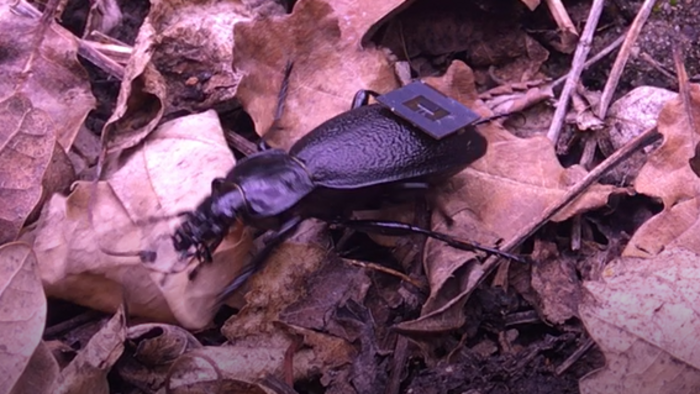Leipzig/Jena/Bad Lauchstädt. Global warming is affecting terrestrial insects in multiple ways. In response to increasingly frequent heat extremes, they have to either reduce their activity or seek shelter in more suitable microhabitats. A new study led by researchers from the German Centre for Integrative Biodiversity Research (iDiv) and Friedrich Schiller University Jena shows: The more diverse these microhabitats are, the better for the insects. For their study, published in Global Change Biology, they developed a new approach to accurately track insect movements and activity.

Credit: Stefan Bernhardt, iDiv
Leipzig/Jena/Bad Lauchstädt. Global warming is affecting terrestrial insects in multiple ways. In response to increasingly frequent heat extremes, they have to either reduce their activity or seek shelter in more suitable microhabitats. A new study led by researchers from the German Centre for Integrative Biodiversity Research (iDiv) and Friedrich Schiller University Jena shows: The more diverse these microhabitats are, the better for the insects. For their study, published in Global Change Biology, they developed a new approach to accurately track insect movements and activity.
Anthropogenic global warming has far-reaching implications for the world we live in. Some of these changes might be less obvious and often go unnoticed for a long time. For example, a warming climate is also affecting terrestrial insects such as beetles, ants, and butterflies. To survive under great heat, they have to either reduce their physical activity to conserve energy, or seek shelter in a cooler environment. A natural and diverse ecosystem offers many microhabitats that provide more favourable climate conditions as well as food for insects. But in the face of land-use changes, the diversity of these microhabitats is declining. This is not only affecting terrestrial insects, but also the important ecosystem services they are providing, such as pollination, the formation of humus and general improvement of soil quality.
A team led by researchers from iDiv and Friedrich Schiller University Jena studied the effects of a warming climate and the availability of microhabitats on the activity of terrestrial insects. For their study, they used the iDiv Ecotron, which consists of several isolated ecosystems (so-called EcoUnits). Here, environmental conditions such as light, nutrients and humidity can be controlled and manipulated. The researchers studied six insect species that can be found in the surrounding area of Leipzig (Germany), including the beetle species Carabus coriaceus, firebugs (Pyrrhocoris apterus), and house crickets (Acheta domesticus).
Accurate activity tracking based on Radio Frequency Identification
To accurately track the movements of a total of 465 insect individuals, the researchers developed a new tracking method based on Radio Frequency Identification (RFID). “Heavy GPS collars that are typically used for large mammals are not suitable for small animals such as insects. With the help of a very light RFID tag, we can now also track movement patterns of insects in complex habitats”, says first author Jördis Terlau, who led the study as a doctoral researcher at iDiv and Friedrich Schiller University Jena.
Within the EcoUnits, the researchers simulated heat extremes based on data that had been recorded by the Deutscher Wetterdienst (DWD) in 2018 and 2019. Temperatures were reaching a maximum of 38.7 °C. They also added leaf litter from four different tree species to the EcoUnits – the litter was either separated or well-mixed. With the help of the RFID tracking, they found that insects apply different strategies in response to heat extremes, depending on the microhabitat conditions. In mixed litter conditions, the insects significantly reduced their activity. In contrast, they increased their activity when the leaf litter was spatially separated. “We assume that mixed leaf litter not only provides protection from heat, but also various food sources. Insects can move less and still find enough food, which helps them save energy”, says Jördis Terlau.
Diverse microhabitats can mitigate the effects of heat extremes
However, in environments with spatially separated leaf litter, the insects had to move more in order to find enough food and leave their shelter. This, in turn, increased their energy consumption, which is of disadvantage under extreme heat and increases the risk of overheating. “This stresses the importance of diverse habitats and microhabitats. In this way, the effects of extreme heat on insects can be significantly mitigated”, says last author Dr Myriam Hirt from iDiv and Friedrich Schiller University Jena. The study also highlights the various benefits of heterogeneous habitats such as mixed forests. They provide terrestrial insects with favourable conditions and food, and help ensure that important ecosystem services can be provided in the future also in the face of climate change.
Journal
Global Change Biology
DOI
10.1111/gcb.16712
Method of Research
Experimental study
Subject of Research
Animals
Article Title
Microhabitat conditions remedy heat stress effects on insect activity
Article Publication Date
26-Apr-2023




